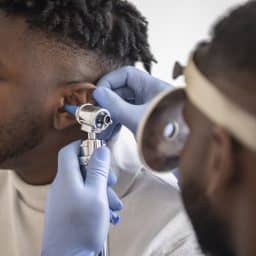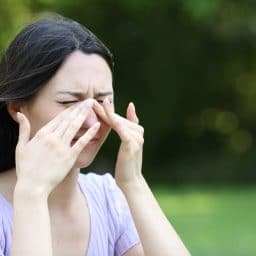Dr. Maggie McCarthy Discusses the Importance of Proactive Hearing Healthcare
ALBANY, NY — (June 28, 2022) Albany ENT & Allergy Services’ own Dr. Maggie McCarthy, Au.D., CCC-A, CPS/A was featured in an article published by Capital District Physicians’ Health Plan, highlighting the importance of proactive hearing health care. Dr. McCarthy, a renowned audiologist, explained why people concerned with hearing loss can vastly improve the quality of their lives…
If Your Doctor Has Recommended a Mastoidectomy, Here’s What You Should Know

The mastoid is the part of your skull located behind your ear, and it is filled with air cells made of bone that are shaped like honeycomb. A mastoidectomy is a surgical procedure that may be recommended to remove diseased mastoid air cells, which are usually the result of an ear infection that has spread…
What Should I Expect During a Septoplasty?

The septum is the bone and cartilage that divides your nostrils. When the septum is crooked, it is known as a deviated septum. A deviated septum can impact your ability to breathe while hiking on Albany County Helderberg-Hudson Rail Trail. Septoplasty is a surgical procedure that corrects a deviated septum. Below we review everything you…
Would a PROPEL Implant Be a Fitting Solution for My Sinus Symptoms?

If you suffer from sinus symptoms after hiking on Albany County Helderberg-Hudson Rail Trail, you may be looking for anything that will provide relief. While many undergo surgery, there’s a new solution on the market called the PROPEL implant. We review everything you need to know about the PROPEL implant below. What Is Chronic Sinusitis?…
Dr. Gavin Setzen and Dr. Nora Perkins Help Lead Breakthrough Clinical Research to Restore Hearing Loss
Leading Otolaryngologists Team Up with Frequency Therapeutics in National Clinical Trial Albany, NY – (June 9th, 2022) The mission at Albany ENT & Allergy Services (AENT), the preeminent private otolaryngology practice in the Capital Region, is to offer superior ear, nose, throat, allergy and sleep care to each one of its Capital Region patients. But…
Albany ENT & Allergy Services’ Dr. Perkins Highlighted in Local News Report on Higher Pollen Counts
Albany, NY — (June 1, 2022) Albany ENT & Allergy Services’ own Dr. Nora W. Perkins (M.D., MBA, FACS, FAAOA) was highlighted in a recent news report from WTEN NEWS10 ABC on increasing pollen counts.
Should I Be Concerned if My Child is Snoring?

Snoring is more common among adults, but children can snore, too. If it only happens occasionally and doesn’t seem to affect their sleep quality, there is no cause for concern. However, sometimes snoring can indicate that your child has more serious sleep issues that need addressing. Causes of Snoring in Children The causes of snoring…
Can Allergen Immunotherapy Prevent Pediatric Asthma?

Asthma is a lung condition that causes episodes where the airways narrow and produce extra mucus. This can cause symptoms such as trouble breathing, shortness of breath, wheezing, and coughing. Asthma can be managed by avoiding triggers, like pollen at Lincoln Park, and taking medications. Recent research shows it can also be prevented by undergoing…
Sleep Apnea Surgery: Preparation & Recovery

Obstructive sleep apnea is a common sleep disorder characterized by pauses in breathing during sleep. These episodes are caused by the tissues in the mouth and throat collapsing into the airway, blocking air flow. There are many treatment options for obstructive sleep apnea, and one of them is surgery. We review everything you need to…
How to Know if Your Child Needs Their Tonsils Removed

While tonsillectomies aren’t as common a procedure as they used to be, some children still benefit from them if they suffer from specific conditions. Removing Tonsils to Improve Child’s Sleep Apnea More than 500,000 children in the United States get their tonsils and adenoids removed each year. The most common reason is to help treat…